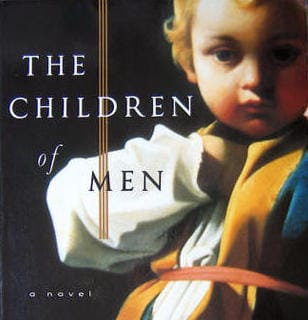Reproductive decline

What would happen if humans stopped being able to reproduce? The novelist P.D. James took the counterfactual as a premise for her 1992 book The Children of Men. In the beginning of the story, set in 2021, the reader hears that the sperm count of human males had quite suddenly decreased to zero in the year 1994. No new children were born after that point. After a couple of decades, the memories of having babies and children around had mostly faded. A solution to the fertility problem had not been found, and in the novel we find a society that is mothballing itself in preparation of a seemingly inevitable end.
Today I was reminded of James' book when I read that COVID-19 has a detrimental effect on sperm count in human males. There's a string of scientific studies showing that this is yet another bit of damage done by the pandemic. One study describes a significant reduction of sperm count right after an infection with SARS-CoV-2 in 37% of males. Another study confirmed this result, and found that sperm concentration in their control group of COVID-negative males was significantly higher than in the group of COVID-19 patients they tested. With an increasingly large portion of the population being exposed to the virus time and time again, could we be facing the kind of scenario sketched by James?
It is good to read these findings in context. As the authors of these studies note themselves, it is highly likely that the dramatic effects of COVID-19 on sperm count are short-lived. Where the first study I mentioned found a reduction in 37% of males within one month of infection, compared to non-infected controls, after one month this dropped to 29%, and after two months it was only 6%. It is well known that sperm count positively correlates with hormones like testosterone, and that the production of those hormones in turn can be suppressed by fever. A human male who has recently had a prolonged fever is therefore likely to be less fertile. However, this effect is normally only temporary, as hormone levels typically restore after recovery. (That said, testosterone levels do seem to be more severely suppressed after COVID-19 than after other respiratory illnesses.)
Still, this should only be a moderate reassurance to those who want to see the human species survive for much longer. Mean sperm count in human males has been plummeting for a long time, with the decline starting well before the pandemic. A 2017 study found that between 1973 and 2011 sperm count in males living in North America, Europe, Australia, and New Zealand has more than halved. A review published this year found that the decline had in 2018 already reached 62%, and moreover, that the decline seems to be exponential, with the decline per year doubling every year since 2000. What causes this dramatic decline in fertility? The factors of influence are varied and not well-understood. But it is clear that many of them can be traced back to capitalist exploitation of people and nature: high-stress, poor nutrition, polluted environments, and poor air quality.
In James' novel, the cause of the sudden drop in male fertility remains a mystery. She describes how scientists have conducted study after study, but have eventually given up their inquiry. In the real world, it is likely that the prime causes of the decline are (as so often) too inconvenient to acknowledge. It's more profitable to pretend everything's fine.
COVID-19 by itself is unlikely to be a cause of long-term infertility. But it may well speed up the rapid decline of mean sperm count already set in motion. I've noticed that societies have a very hard time getting to terms with the fact that unmitigated spread of SARS-CoV-2 continues to aggravate the shortages on the labour market and the pressure on hospitals. It should not come as a surprise if any sudden increase in male infertility due to repeated exposure to variants of SARS were to be brazenly described as 'mysterious' until it's too late.